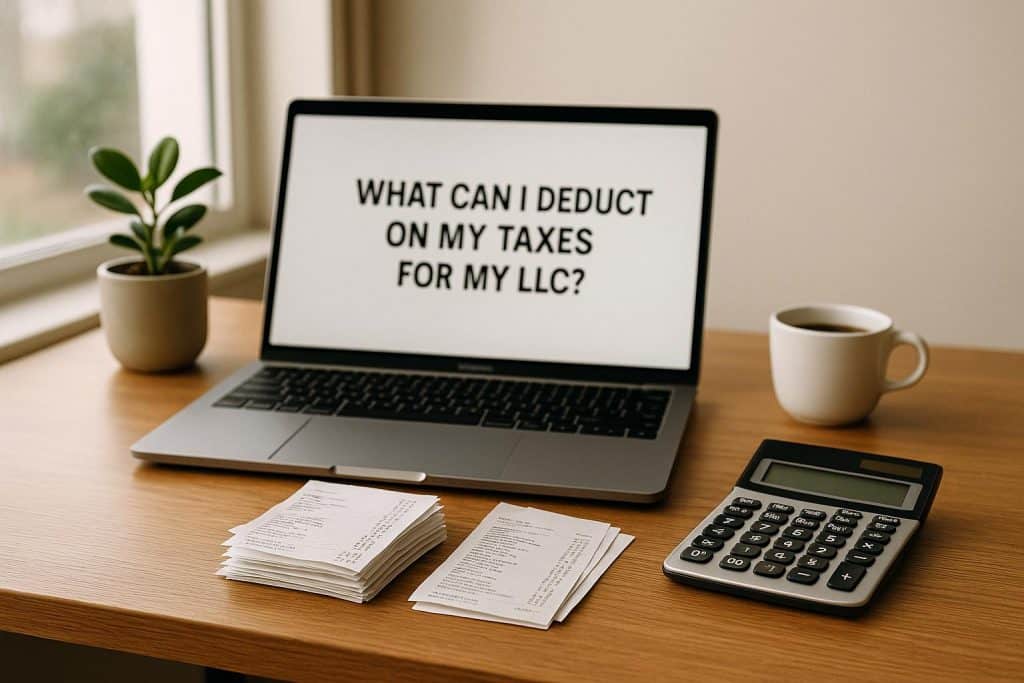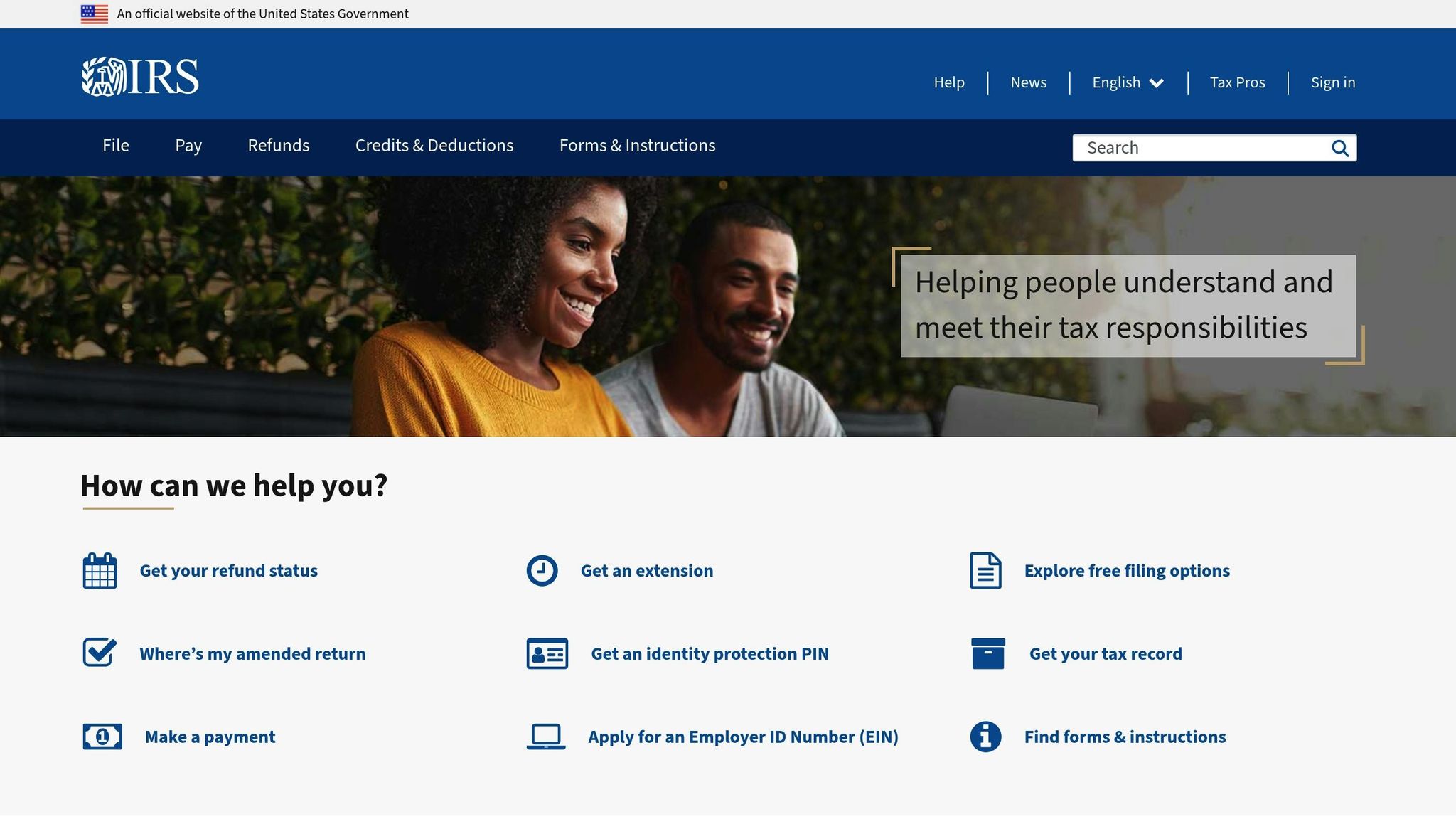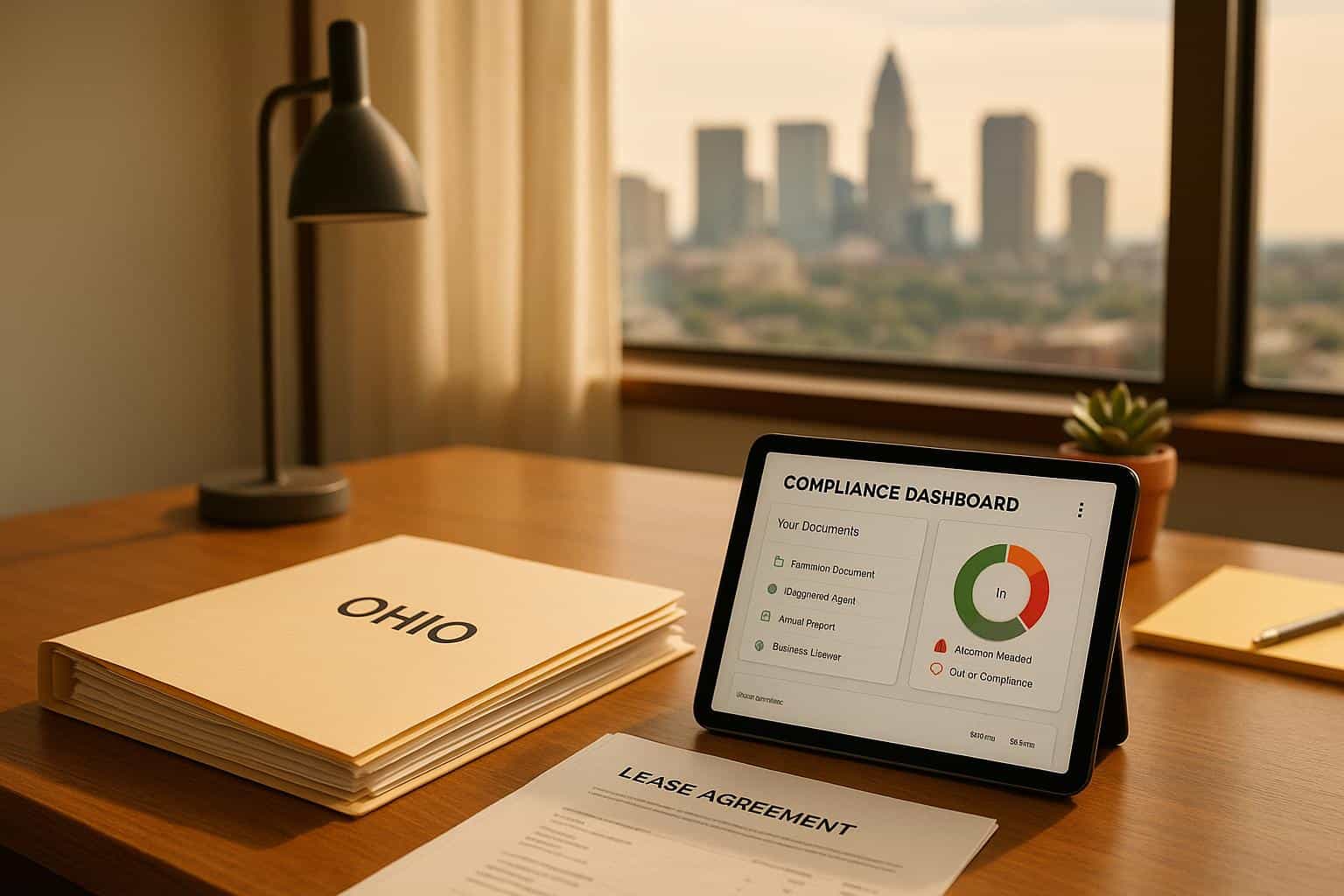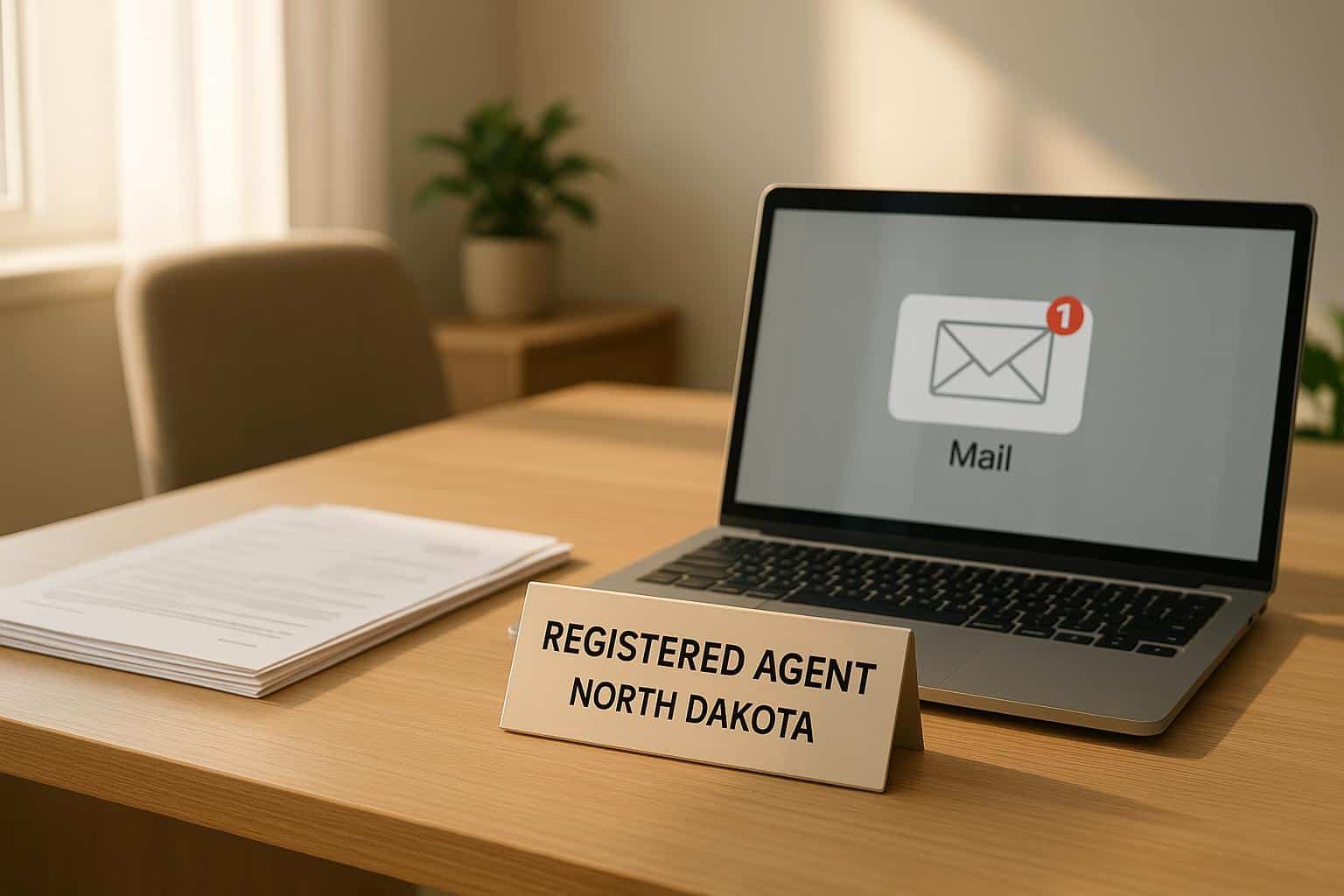LLC owners can save on taxes by deducting common business expenses. These deductions reduce taxable income directly, making them a key part of managing your LLC’s finances. Here’s what you need to know:
- Home Office: Deduct $5/sq. ft. (up to 300 sq. ft.) or a percentage of home expenses based on office size.
- Travel Costs: Write off airfare, lodging, meals (50%), and vehicle expenses using actual costs or IRS mileage rates.
- Professional Services: Fees for accountants, lawyers, consultants, and industry-specific advisors.
- Equipment & Supplies: Immediate deductions for items under $500 or with a useful life under 12 months.
- Advertising: Costs for ads, social media, websites, and promotional materials.
- Qualified Business Income (QBI): Deduct up to 20% of business income (income limits apply).
- Section 179 Deduction: Write off up to $1,250,000 for equipment in 2025.
- Health Insurance: Deduct premiums for yourself, spouse, and dependents if self-employed.
Keep accurate records and stay compliant with IRS rules. Tools like BusinessAnywhere can help organize documents and streamline tax preparation. Always consult a tax professional for personalized advice.
Common Tax Deductions for LLCs
If you own an LLC, you can lower your tax bill by deducting many everyday business expenses.
Home Office Expenses
If you work from home, you can deduct expenses for the area used exclusively for business. According to the IRS, your home office must be your primary place of business, a space for meeting clients, or a separate structure used for business purposes.
"The home office deduction allows you to subtract some office expenses from your taxable income and reduce the amount of taxes you owe."
You can calculate this deduction using two methods:
- Simplified method: Deduct $5 per square foot of your home office, up to 300 square feet.
- Regular method: Deduct a percentage of your home expenses based on the size of your office. For example, if your home office is 200 square feet and your home is 2,000 square feet, you can deduct 10% of qualifying expenses like mortgage interest, rent, utilities, and maintenance.
This deduction can be a great way to offset some of the costs of running your business from home. But tax savings don’t stop there – travel-related expenses are another area to explore.
Business Travel Costs
When traveling for business, many of your expenses are deductible if the trip takes you far enough from your tax home to require rest or sleep.
You can deduct transportation costs like airfare, train tickets, car rentals, and baggage fees. If you use your personal vehicle, you can either deduct actual expenses or use the IRS standard mileage rate. Lodging costs, such as hotel stays or short-term rentals, are also deductible.
Meals during business travel are 50% deductible, whether dining alone or with business associates, as long as the meals serve a legitimate business purpose and aren’t overly extravagant. Even small expenses like laundry, dry cleaning, tips, and business-related phone calls can be deducted. While receipts aren’t required for non-lodging expenses under $75, you should still keep detailed records, including dates, locations, and the purpose of each expense.
Professional Services
Fees paid to professionals like accountants, attorneys, and consultants are deductible if they are necessary for your business. This includes costs for tax preparation, legal advice, and business strategy planning. Other deductible services include marketing consultants, web designers, IT support, and advisors specific to your industry, as long as their work is directly related to your business operations.
Equipment and Supplies
The IRS allows LLCs to deduct the cost of equipment and supplies needed for business. Items costing $200 or less, or those with a useful life of 12 months or less, can be immediately deducted in the year they are purchased or used.
The de minimis safe harbor rule lets you deduct tangible items costing $500 or less in the year of purchase. This rule can make it easier to write off costs for office furniture, computers, printers, software, and industry-specific tools. Be sure to keep detailed records of when and how these items are used for business purposes.
Advertising and Marketing Expenses
Promoting your LLC comes with deductible expenses. Traditional advertising like print ads, radio spots, and billboards qualifies, along with digital marketing expenses like social media ads, Google Ads, and email marketing software. Website-related costs, such as domain registration, hosting, and professional web design, are also deductible.
If you hire photographers, videographers, or copywriters for promotional materials, their fees can be deducted as well. Participating in trade shows, including booth rentals and travel expenses, counts too. Even smaller items like business cards, brochures, and promotional giveaways are deductible if they’re directly tied to your marketing efforts.
Special Deductions for LLC Owners
LLC owners have access to some enticing tax benefits, especially since these businesses are often treated as pass-through entities. These benefits go beyond the usual deductible expenses and can significantly lighten your tax burden.
Qualified Business Income (QBI) Deduction
The QBI deduction, introduced by the Tax Cuts and Jobs Act (TCJA) in 2017, allows eligible LLC owners to deduct up to 20% of their qualified business income (QBI). For 2024, the full deduction applies to single filers earning up to $191,950 and joint filers earning up to $383,900. It also includes 20% of qualified Real Estate Investment Trust (REIT) dividends and Publicly Traded Partnership (PTP) income.
This deduction is available for tax years starting after December 31, 2017, and is set to expire on December 31, 2025, unless Congress extends it. For higher earners, the deduction phases out between $191,951 and $241,950 for single filers, and between $383,901 and $483,900 for joint filers.
However, there are additional restrictions for Specified Service Trades or Businesses (SSTBs) – such as professions in health, law, consulting, and financial services. For these businesses, eligibility depends on staying below the income thresholds.
The QBI deduction can lead to substantial tax savings, potentially reducing your taxable income by thousands or even tens of thousands of dollars, depending on your business’s size. However, it’s important to note that this deduction doesn’t lower self-employment tax.
Another valuable tax-saving tool for LLCs is the Section 179 deduction.
Section 179 Deduction
The Section 179 deduction allows LLCs to write off the full cost of qualifying equipment and software in the year it’s put into service, rather than spreading the deduction over several years. For 2025, you can deduct up to $1,250,000, though the deduction begins to phase out if your total equipment purchases exceed $3,130,000. To qualify, the equipment must be used for business purposes more than 50% of the time and placed into service during the tax year.
| Year | Section 179 Deduction Limit | Phase-out Limit | SUV Limit |
|---|---|---|---|
| 2024 | $1,220,000 | $3,050,000 | $30,500 |
| 2025 | $1,250,000 | $3,130,000 | $31,300 |
| Difference | $30,000 increase | $80,000 increase | $800 increase |
Both new and used equipment qualify for this deduction. Examples of eligible items include manufacturing tools, business vehicles, furniture, software, and even certain building improvements.
For instance, if a construction company invests $3,000,000 in new machinery in 2025, it could deduct up to $1,250,000 under Section 179 and use bonus depreciation for the remaining cost, significantly reducing its tax bill.
If your Section 179 deduction exceeds your LLC’s taxable income, you can carry the unused portion forward to future tax years. To claim this deduction, you’ll need to file Form 4562 with your tax return, detailing the qualifying assets and their costs.
Health Insurance Premiums
LLC members who are self-employed can deduct health insurance premiums for themselves, their spouses, and dependents. This deduction directly reduces your Adjusted Gross Income (AGI), offering a valuable tax break.
"If you’re a self-employed individual filing a Schedule C or Schedule F, you can purchase a health insurance policy in either the name of your business or your own name and qualify for the self-employed health insurance deduction." – Miguel Burgos, CPA, Washington
To qualify, the health insurance plan must be established under the business, and the deduction cannot exceed your earned income from the LLC. Additionally, you can only claim this deduction for months when neither you nor your spouse were eligible for an employer-sponsored health plan.
Deductible premiums include medical, dental, vision, and qualified long-term care insurance. For long-term care insurance, deductions are capped based on age:
| Age Range | 2024 Deduction Limit |
|---|---|
| 40 and younger | $470 |
| 41 to 50 | $880 |
| 51 to 60 | $1,760 |
| 61 to 70 | $4,710 |
| Over 70 | $5,880 |
Since 2003, self-employed individuals have been able to deduct 100% of their health insurance premiums. However, if you receive a premium tax credit through the Health Insurance Marketplace, you must reduce your deduction by the credit amount. The policy can be in your name or the business’s name, and for partners, it can be in the partnership’s name as long as the partnership reimburses you and reports the premiums as guaranteed payments.
These deductions provide LLC owners with powerful tools to reduce taxable income while staying within the bounds of tax law.
IRS Compliance and Recordkeeping
Keeping accurate records is your best defense when claiming deductions during an IRS audit. Without proper documentation, even legitimate deductions can be denied, potentially leading to extra taxes and penalties. To avoid this, it’s crucial to organize your expenses effectively.
Organizing Business Expenses
The first step in recordkeeping is separating your business and personal finances. Open a dedicated business bank account exclusively for your LLC’s transactions. This separation not only simplifies bookkeeping but also ensures clarity during IRS audits. Adding a business credit card can make tracking expenses even smoother.
Accounting software can take the hassle out of managing expenses. By syncing with your bank accounts and credit cards, it automatically categorizes transactions and flags potential deductions. For cash transactions, make it a habit to record the date, amount, and business purpose right away. Even minor expenses can add up over time, so timely documentation is essential.
Documentation Requirements
Once your expenses are organized, the next step is to ensure you have the right documentation. The IRS requires more than just receipts for many deductions. Here’s what you’ll need for specific claims:
- Business meals: Keep receipts and jot down details about the attendees and the business purpose.
- Vehicle expenses: Maintain detailed mileage logs, including dates, destinations, and the reason for each trip.
- Home office deductions: Measure your workspace and provide evidence that it’s used solely for business purposes.
- Equipment purchases: Save invoices and note the percentage of business use for each item.
To keep these records safe, consider using a secure, cloud-based storage system. This ensures your documents are accessible when needed. Generally, the IRS requires you to hold onto records that support income, deductions, or credits for three years from the date you file your return. For employment-related records, keep them for at least four years.
Staying Updated with IRS Rules
Tax laws are constantly evolving, so staying informed is crucial. For example, federal income tax brackets for 2025 have been adjusted by 2.8% to account for inflation. Additionally, significant changes like the Tax Cuts and Jobs Act (TCJA), set to expire at the end of 2025, could impact deductions such as the Qualified Business Income (QBI) deduction.
New compliance requirements are also emerging. The Corporate Transparency Act (CTA) now requires LLCs to file beneficial ownership statements, with fines starting at $500 per day for missed deadlines. To avoid costly mistakes, mark all tax deadlines on your calendar, pay quarterly taxes on time, and regularly review your withholding and estimated tax strategies.
Working with a knowledgeable accountant or tax professional can make a big difference. They can help you navigate changing regulations, optimize your deductions, and steer clear of penalties. Additionally, stay informed by reading IRS publications and subscribing to updates from trusted tax news sources.
sbb-itb-ba0a4be
Using BusinessAnywhere for LLC Management and Tax Preparation
Managing LLC taxes becomes far more manageable with the right tools for organizing documents and ensuring compliance. BusinessAnywhere provides a platform designed to tackle common recordkeeping challenges, simplifying tax preparation for business owners.
By focusing on efficient document organization, BusinessAnywhere consolidates everything you need in one place, making tax preparation a smoother process.
Virtual Mailbox and Document Management Dashboard
One of the toughest parts of tax preparation is keeping track of important documents throughout the year. BusinessAnywhere’s virtual mailbox service solves this by offering a real physical address where LLC owners can receive mail. This mail is scanned and uploaded to a personalized dashboard for easy access. Whether you’re at home or traveling, you can view, download, or forward your mail with just a few clicks, making it a great option for business owners who work remotely.
The platform includes unlimited scanning and storage, so you never have to worry about running out of space for critical tax documents. Plus, it automatically filters out junk mail, ensuring your dashboard only contains relevant items.
Accessible on any device, the dashboard allows seamless sharing with your accountant or use during quarterly filings.
BusinessAnywhere offers straightforward pricing to fit different needs:
- Basic Plan: $20/month for up to 2 mail recipients.
- Premium Plan: $30/month for up to 5 recipients.
- Advanced Plan: $65/month for up to 20 recipients.
Compliance and Recordkeeping Support
In addition to managing documents, BusinessAnywhere helps with ongoing compliance requirements. Accurate recordkeeping is especially important in the event of an IRS audit, and this platform brings together company formation, registered agent services, virtual mailbox options, and online notary tools in one place. This centralized system lets you handle all your business operations from a single dashboard.
The registered agent service actively monitors your compliance status. With built-in reminders and alerts, you’ll stay on top of filing deadlines and regulatory requirements without having to use multiple services.
For tax preparation, this means your legal filings, administrative paperwork, and mail are all organized in one system. This makes it easier to gather everything you need for deductions or other tax-related tasks.
BusinessAnywhere has earned a solid 4.7 out of 5 rating from 60 reviews on Trustpilot. Many users highlight how the platform simplifies business management by combining essential tools into a single service, saving time and avoiding the hassle of juggling multiple subscriptions.
Another benefit is privacy. By using BusinessAnywhere’s address for business registration, you keep your home address private, maintaining a clear boundary between personal and professional life. The service can receive and forward any type of document at your request, giving you full control over your business correspondence and tax records.
Conclusion
From everyday costs to niche deductions, this guide has highlighted how every expense plays a role in reducing your tax obligations. To make the most of your LLC tax deductions, focus on keeping thorough records year-round and understanding which expenses qualify. As the IRS puts it, "Generally, any expense considered ‘ordinary and necessary’ for your business can be deducted from your LLC taxes". Since LLCs are pass-through entities, these deductions directly affect your personal tax return.
LLC owners can take advantage of several key deductions, including a 7.65% reduction on self-employment tax, up to $5,000 for startup expenses, and a 50% deduction for eligible business meals.
Tools like BusinessAnywhere can make managing deductions easier by streamlining document organization and compliance tracking. This allows you to focus on growing your business without worrying about messy tax records. Staying updated on tax law changes and seeking advice from qualified tax professionals for complex situations can further help you maximize deductions while staying compliant. Pairing these strategies with smart recordkeeping tools ensures that managing LLC tax deductions becomes a smooth and stress-free part of your business routine.
FAQs
What are the IRS rules for claiming a home office deduction for my LLC?
To qualify for a home office deduction for your LLC, the space must be used exclusively and regularly for business purposes. This means it can’t double as a personal area and should consistently serve work-related activities. Additionally, it needs to be your primary place of business or a location where you meet with clients or customers.
When it comes to calculating the deduction, you have two options:
- Simplified method: Deduct $5 per square foot of your office space, up to 300 square feet (with a maximum deduction of $1,500).
- Actual expenses method: Deduct a portion of your home expenses – like utilities, mortgage interest, property taxes, and insurance – based on the percentage of your home devoted to business use.
Be sure to maintain detailed records and documentation to stay in line with IRS requirements and make the most of the tax benefits available to you.
What are the rules for claiming the Qualified Business Income (QBI) deduction for my LLC?
Qualified Business Income (QBI) Deduction for LLC Owners
The Qualified Business Income (QBI) deduction gives eligible LLC owners a chance to deduct up to 20% of their qualified business income (QBI) on their federal taxes. But before you get too excited, there are specific requirements and limits you’ll need to meet.
First, your taxable income needs to fall below certain thresholds. For 2023, the deduction starts phasing out if your taxable income exceeds $364,200 for married couples filing jointly or $182,100 for single filers. Once you go over these limits, additional rules kick in. These include restrictions based on W-2 wages paid by your business or the value of qualified property your LLC owns.
Also, not all income counts as QBI. For instance, investment income and wages you pay yourself as an owner don’t qualify. To make sure you’re following IRS regulations and maximizing your deduction, it’s a smart idea to consult a tax professional who can provide advice tailored to your situation.
How can BusinessAnywhere help me manage my LLC’s tax documents and stay compliant with IRS rules?
BusinessAnywhere makes handling your LLC’s tax documents a breeze. It provides tools to automate tax calculations, keep track of filing deadlines, and neatly organize essential records. Plus, it helps ensure you’re meeting IRS requirements by reducing mistakes, maintaining clear documentation, and simplifying the reporting process.
With everything organized and easy to access, BusinessAnywhere saves you time, lowers risks, and helps you confidently manage your LLC’s tax responsibilities.









